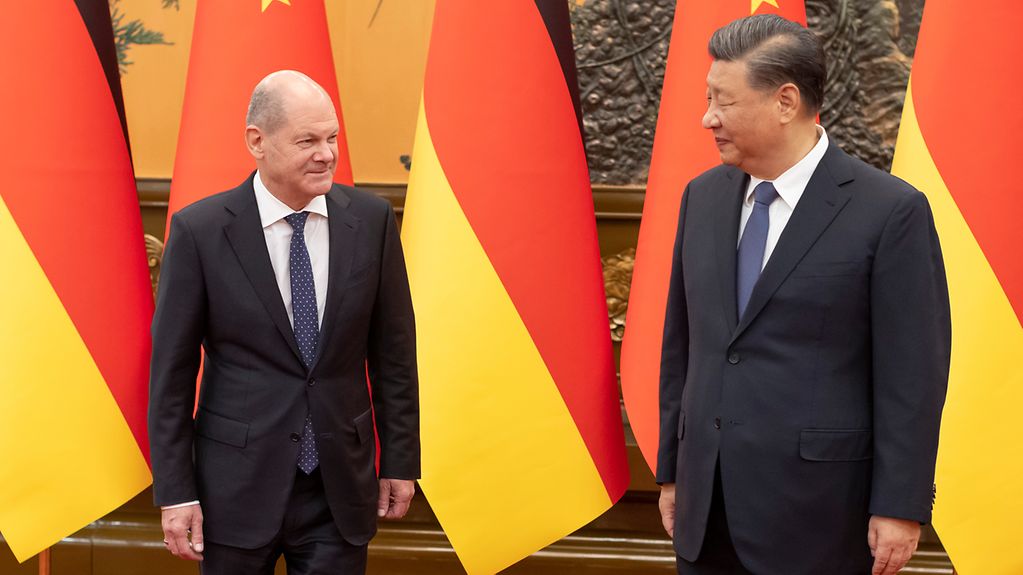Federal Chancellor Scholz on his inaugural visit to China
Federal Chancellor Scholz' talks with Xi Jinping, General Secretary of the Chinese Communist Party, and Premier Li Keqiang in China focused on international issues, bilateral relations, and economic matters.
4 min reading time

Federal Chancellor Scholz meets with Xi Jinping, General Secretary of the Chinese Communist Party, in Beijing.
Photo: Federal Government/Imo
Germany and China wish to collaborate even more closely in dealing with global crises, as the Federal Chancellor emphasised following his talks with General Secretary Xi Jinping and Premier Li Keqiang. It was now, he said, even more important than ever to talk to each other in view of the many current global challenges and crises adding that: "Putin's war challenges the global peace order," said Scholz: "At our meeting in Beijing, I asked General Secretary Xi to use his influence on Russia." Both agreed that threats to use nuclear weapons were extremely dangerous, said Scholz, adding that any such deployment would cross a red line.
Premier Li highlighted the open and honest dialogue with his German guest and recalled the tradition of good and close collaboration between Germany and China since the re-establishment of diplomatic relations 50 years ago. Earlier, General Secretary Xi Jinping praised the Federal Chancellor's commitment to German-Chinese relations and recalled their first meeting in 2017. In a statement he issued prior to his meeting with the Federal Chancellor, he stressed that Germany and China should continue to treat each other with mutual respect, seek common ground despite existing differences and focus their collaboration on mutual benefits, which would ensure that the two countries remained on the right course.
Ukraine war endangers global stability
According to Federal Chancellor Scholz, the talks covered a wide range of topics, from the Russian attack on Ukraine and its ramifications for global stability, to climate change, human rights issues, and bilateral relations.
The Federal Chancellor once again called upon Russia to end its attack and withdraw its troops from Ukraine and added that hunger must not be weaponised.
Li stressed the importance of ending the conflict between Russia and Ukraine as soon as possible and said that any further escalation must be avoided. The conflict, he continued, was already endangering global stability, while supply chains, food and energy markets were being disrupted.
Collaboration in the fight against the pandemic
The Federal Chancellor acknowledged that Germany and China had different approaches to combating the COVID-19 pandemic but also that both sides were aware of their responsibilities, which is why they had agreed on an even closer collaboration. Approving the use of vaccines from the German manufacturer Biontech/Pfizer for foreigners living in China was a first step, he said. Whilst a general approval of this vaccine in China was also conceivable, he noted, this would require closer collaboration between the Chinese and European regulatory authorities. Closer collaboration between the Robert Koch Institute and the Chinese side had already been agreed, said Scholz.
Together against climate change and for biodiversity
The Federal Chancellor announced that a bilateral climate and transformation dialogue had been agreed with China, adding that Germany and China were also keen to work together to advance the preparatory work for a global biodiversity agreement. Regarding the global debt situation, which is partially the result of rising food and energy prices, the Federal Chancellor said he viewed Germany and China as important donor countries with a shared responsibility. According to the Federal Chancellor, all of these issues were also to be on the agenda at the German-Chinese intergovernmental consultations next year.
Premier LI emphasised China's continuing commitment to sustainable global development, free trade, and multilateralism.
Open discussion on economic relations and human rights
Scholz expressed his satisfaction with the close bilateral relations between Germany and China, especially in the economic sphere and said that he hoped that it would be possible to eliminate difficulties for German companies trying to access markets in China and to enforce intellectual property rights, which he described as an imbalance in trade relations. "We have to restore more free trade here," said the Federal Chancellor, who went on to say that the German business sector was concerned about the emphasis placed on economic self-sufficiency in China and, in general, a tendency to subordinate economic collaboration to political objectives. He welcomed the fact that it had been possible to speak openly about this. The subject of Taiwan had also been discussed openly, said Scholz, who recalled Germany's One China policy, one of the expectations of which was that any status changes should only be made by mutual agreement.
Human rights issues were also discussed, whereby the Federal Chancellor made specific reference to the situation in Xinjiang province. "All members of the United Nations, including China, have made a commitment to universal human rights and the protection of minorities," Scholz explained: "There are serious differences between our two countries in this respect. It was important to me to express our unwavering conviction on this matter."









